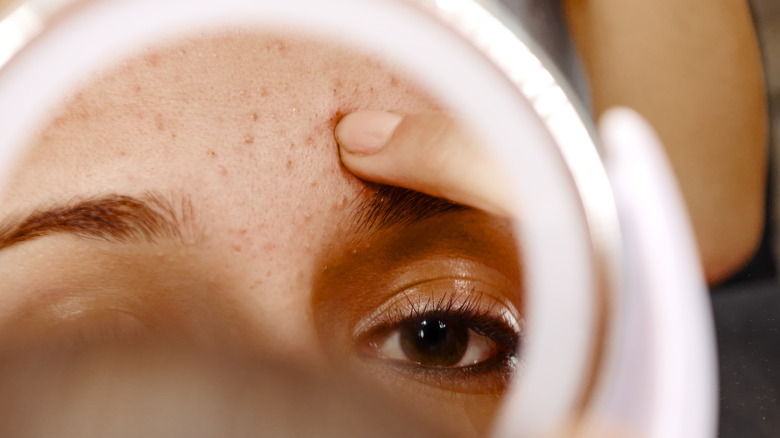The Weird Ways A Breakup Can Affect Your Health
One of the most difficult things any of us will experience in our lives is a breakup. It doesn't matter why a relationship came to an end, all that matters is that someone was in our life, now they're gone, and all that remains is a hole where they used to be. Breakups don't just wreak havoc on our emotions causing post-breakup sadness that can last for months on end, but they physically take a major toll too.
"We found that powerfully inducing feelings of social rejection activate regions of the brain that are involved in physical pain sensation, which are rarely activated in neuroimaging studies of emotion," psychologist and researcher Ethan Kross told Hey Sigmund. "These findings are consistent with the idea that the experience of social rejection, or social loss more generally, may represent a distinct emotional experience that is uniquely associated with physical pain."
But all those aches, from your head down to your toes (literally), aren't the only way your health is affected by a breakup. There are more, even stranger ways that breakups can physically mess with you.
You can experience breakouts
As you probably already know, stress has a major impact on our skin. And, of course, nothing induces stress quite like a breakup. When cortisol, the stress hormone, is increased in the body, it can signal it to do lots of whacky things. One of those things is increasing oil production, also known as sebum, making the skin a "better host for the bacteria that causes acne and the clogging of the follicles, and you get an increase in acne," dermatologist Debra Luftman told Cosmopolitan. If that weren't enough, adrenaline — another stress hormone — increases inflammation, causing the skin to be sensitive and more prone to dermatological issues.
But it's not just the hormones doing their dirty deeds that can contribute to breakouts; how we respond to breakups isn't doing our skin any favors either. Eating poorly, especially things that are high in sugar, can cause inflammation that results in the breakdown of collagen, and not keeping up with your hygiene, especially your skincare routine, can also be a factor in your skin going awry.
Your appetite could be all over the place
While there's the cliché that breakups have some reaching for a pint of ice cream to cure their broken heart, for a lot of people the desire to eat completely goes away with a breakup. The reason comes back to stress and increased levels of adrenaline and cortisol which affect heart rate. When your heart rate is increased, it's physically impossible to keep food in your system. As neurobiologist Gert ter Horst told Vice, this is the body in survival mode where eating doesn't have the same importance as it does when your heart isn't in tatters.
On the flip side of appetite loss, you could find yourself craving some pretty strange things. "The areas of the brain in charge of emotions and emotional pain also [regulate] how we eat, our need for food, and what we taste," said ter Horst. "The areas that take care of these functions are close together, and can influence one another." So if things aren't tasting as they did before or you find yourself unable to eat something because of the memories attached to it, it's just your brain responding to increased stress hormones and decreased oxytocin levels.
You might get sick easier and more often
Immune health is paramount when it comes to staving off infections and disease. But like the rest of the body, when the cortisol starts flowing, the immune system takes a major hit and the amount of lymphocytes you have can decrease. These white blood cells are essential to maintaining a strong immune system. "Normally when you're confronted with bacteria or virus, your body will mount a defense," board-certified family doctor Dr. Valerie Scott told Today. But without enough lymphocytes it can be very difficult for the immune system to work as it should, thereby allowing illness-causing bacteria to just stroll right in.
According to a 2015 study published in Current Opinion in Psychology, when cortisol reaches chronic levels, it can result in the immune system becoming essentially resistant to what it's supposed to do. The fact that cortisol can send the entire immune system into retreat is very reflective of just how powerful stress is in regard to its negative effects on the body.
You could have some not-so-pleasant stomach issues
Because a breakup kicks the fight or flight response into high gear, the body isn't working properly on many levels. One place we can feel that is in our stomach. "This overwhelming distress often causes physical symptoms like nausea, vomiting, diarrhea, heartburn, headache, low energy, low appetite, insomnia, hypersomnia, [and] increased appetite," licensed counselor Erin Parisi, LMHC told Bustle.
But it's not just the cortisol affecting the GI tract and causing these things. As professor of psychology and neuroscience at Duke University, Mark Leary told Business Insider, the blood that's supposed to be pumped into the stomach to keep digestion on the up and up ends up going into the muscles instead. This can lead to queasiness and nausea, which in turn can cause pooping issues like constipation or diarrhea. In other words, even if you're unable to eat, you could still find yourself running for the toilet when you least expect it.
You won't be able to sleep
According to the Mayo Clinic, when it comes to sleeplessness, stress is almost always the top reason. Stress causes intrusive thoughts — like all those painful walks down memory lane — and, of course, increased cortisol levels. "High levels of stress impair sleep by prolonging how long it takes to fall asleep and fragmenting sleep," neurologist Dr. Annise Wilson told Baylor College of Medicine. "Sleep loss triggers our body's stress response system, leading to an elevation in stress hormones, namely cortisol, which further disrupts sleep." Basically, you have a vicious cycle that can be near-impossible to break.
But while not being able to sleep can be annoying, the side effects can be problematic. Sleep is necessary for cognitive function, mood regulation, as well as staving off certain neurological diseases, according to the American Chemical Society. "Chronic sleep deprivation also has been associated with decreased metabolism and endocrine dysfunction," said Wilson. It also contributes to looking exhausted and those relentless under-eye circles.
Ultimately, a breakup isn't kind to the body. In addition to these side effects, there's possible increased blood pressure, hair loss, and even a weakened heart because, yes, broken heart syndrome is real. While you may not be able to avoid these physical symptoms, you can try to stay ahead of them. Eating healthy, surrounding yourself with loved ones, and talking to a therapist are great proactive things to do. In time, your body (and heart) will recover.





